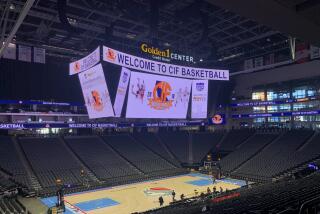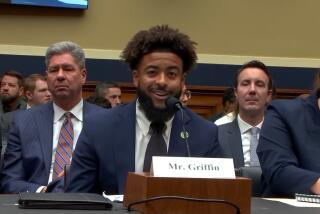The Seamy, Sometimes Sad Side of College Football Recruiting : Colleges Have Trouble Balancing NCAA Rules With Students’ Needs
CHAMPAIGN, Ill. — Documents released under court order by the University of Illinois provide a rare glimpse of big-time college football recruiting--its seamy side and its sad side.
There are details of expensive and improper efforts to keep star athletes in school, and accounts of small acts of kindness toward athletes from poor families.
It is contained in the charges, responses and findings in the NCAA’s two-year investigation--a probe that ended last summer when it placed the Illinois football program on probation.
Illini Media Co., which publishes the campus newspaper, won a lawsuit to obtain the documents but so far has been offered only a censored version--minus the names of most of those involved.
When the university accepted the NCAA sanctions last July, officials said one of the more serious examples of wrongdoing involved two California junior college players.
Elton Veals and Delton Edwards were key recruits from Merritt Junior College who came to Illinois for a few days three years ago.
Assistant coach Max McCartney was to accompany the two athletes back to Illinois--apparently expecting their school to foot the bill. When he realized that was not the case, McCartney used his credit card to obtain cash for the tickets, and later lied to NCAA investigators about it. McCartney said he was not reimbursed for the tickets.
In Champaign, the athletes were driven around town by the coaches, who said it was because the pair were not dressed for the subzero temperatures and “it is the custom in the community to provide rides to strangers.”
The athletes also told investigators they received free meals and free hotel lodging, then were given furnishings for their apartment.
Arrangements were made for the athletes to work for two farmers--contributors to Illinois athletics and frequent guests of university sports officials. There was a $100 payment to the athletes, though it was unclear whether they worked or just rode snowmobiles.
“I don’t see where we did anything wrong,” farmer Bill Kincaid told the Champaign-Urbana News-Gazette.
However, the NCAA considers the farmers representatives of Illinois athletic interests. As such, they are barred from making a payment considered by the NCAA to be “excessive in the light of the amount of work performed.”
Another Illinois booster whose actions were deemed inappropriate by the NCAA was an official of the athletes’ junior college. He was cited for promising one of their mothers free trips to Illinois home games, and for suggesting to one of the athletes he would have the use of a car in Champaign. He also gave the recruits a portable stereo because they “complained that they had nothing to entertain them at the university.”
The NCAA also found that the junior college official promised to send one athlete’s girlfriend to Illinois for a visit, and that Illinois coaches indicated they might be able to get her a job.
Despite all the efforts to please the athletes, they left Illinois quickly, and the university had nothing but a long NCAA investigation to show for it.
The documents also outline improper entertaining of junior college coaches and prospective athletes, including what the NCAA called “excessive entertainment at O’Hare airport by purchasing 45 drinks” for three athletes.
But, the documents also show the dilemma facing athletic officials when they try to balance strict NCAA rules with the basic needs of students. In some cases, university officials say the violations occurred when coaches and their families provided necessities for underprivileged athletes.
Illinois was cited because a coach gave a used refrigerator to an athlete who was on a special diet; a coach’s wife took an athlete’s wife to the grocery store and spent $50 because the couple “had no food and no money,” and a coach gave an athlete used clothing because he did not have adequate winter garments.
However, a substantial number of the 85 violations involve transportation for athletes to and from Champaign and around town, meals and temporary lodging.
The NCAA had the strongest words for coaches John Teerlinck and Gary Horton, who it said displayed a pattern of intentionally breaking the rules. Both left Illinois to coach for professional teams before the sanctions were announced.
The NCAA said the repeated violations cast doubt on management of the program by Athletic Director Neale Stoner and head Coach Mike White.
White and McCartney were punished by the university: no off-campus recruiting and 10 fewer scholarships for one year. And, the probation kept the Illini from accepting a bowl bid in 1984 and will keep them off television in 1985.
White accepted responsibility for the violations, saying he may have added to the “tremendous pressure on the performance of assistant coaches.” He promised “to do a better job” of policing the program.
As for the seven Illini boosters cited by the NCAA, the university agreed to disassociate them from its athletic program.
The university’s internal investigation of the whole episode, including the lengthy report prepared by former federal judge Phil Tone, cost the Athletic Assn. about $700,000. Meanwhile, the legal battle between the university and Illini Media Co., continues. School officials have asked Associate Judge Jack DeLaMar to reconsider his order that all the documents--including nearly all the names--be made public.
Illini Media general manager E. Mayer Maloney accused university officials of trying “to protect someone or hide something” and demanded the full disclosure ordered by the judge.
A hearing is scheduled for Jan. 17.
More to Read
Go beyond the scoreboard
Get the latest on L.A.'s teams in the daily Sports Report newsletter.
You may occasionally receive promotional content from the Los Angeles Times.










